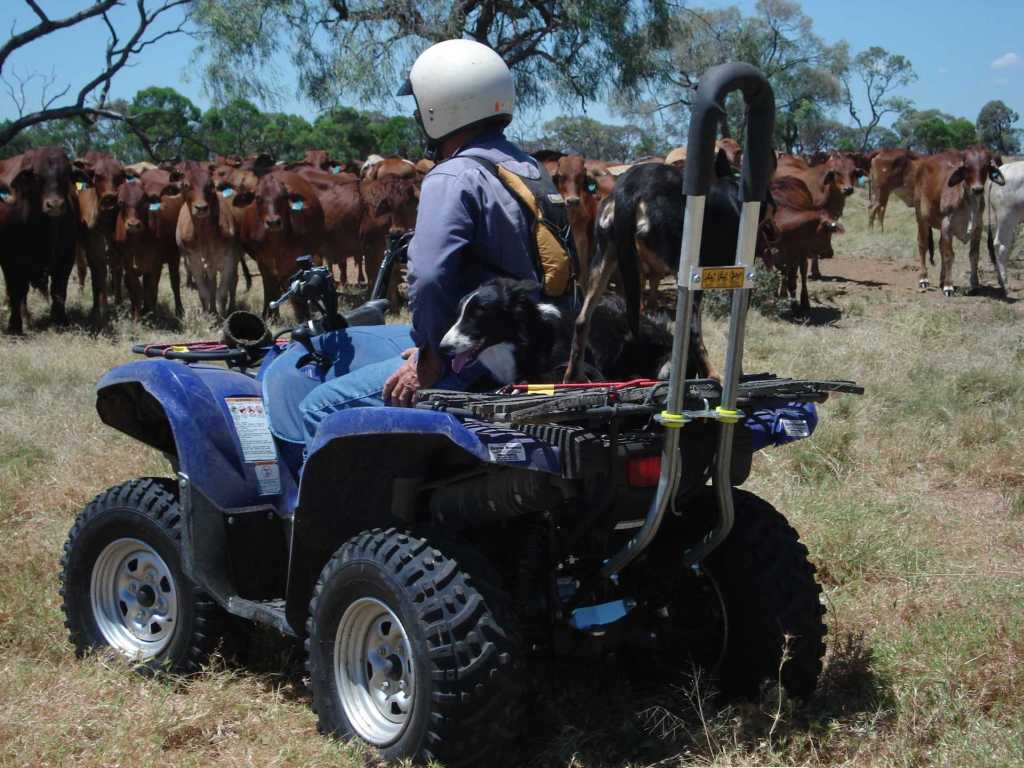
“YOU can’t legislate against stupidity.”
This infamous quote used by ex-premier of Victoria Jeff Kennett is one of my favourites. His frank remark came in response to calls for more safety regulations to be introduced after a young man in Melbourne was killed after standing on top of a moving train.
In my own application, it sparks memories of morons on quad bikes, and one guy who was strapped to the top of a forklift to brush down a vegetable cold store and… the list goes on.
In Australia, our nanny state laws try to protect people from themselves, and, let’s be honest, it’s getting ridiculous. However, when it comes to agriculture and on-farm safety, there’s a lot of push and pull because farmers generally hate regulation. To be frank, they want to do things the way they want to do it, even if it means taking a few risks along the way. She’ll be right!
But the reality is that farming is one of the most dangerous and deadly industries in the country; and when it comes to farm related injuries, the alarming statistics only reflect the incidents that are actually recorded. On a commercial construction site, you have to report a deep scratch. On farms, you just flick the blood off until it dries and worry about it when you get home. Who wants to fill out a form, only to then answer more questions?
When it comes to agtech and farm safety, it’s a real mixed bag of quality and capability, but there’s absolutely a bright future for tech that’s already making a difference today.
There are already some fit-for-purpose apps and technology that are doing a great job at addressing OH&S issues, but is there enough pressure or incentive for farmers to actually use them?
I’m not convinced. Of course corporate farmers are generally very tight on OH&S processes, but as we know, they only make up five or so percent of all farming businesses in Australia.
I’ve always said, agtech will be successful if it takes a task away from the farmer, so agtech will absolutely take paperwork and regulatory reporting burdens from farmers, but that’s only if they choose to operate under strict OH&S standards, until they’re made to.
NZ leading the way with farm safety
New Zealand has seen OH&S regulations forced upon all farmers, so it’s no surprise the Kiwis are leading the way with agtech when it comes to on-farm compliance and reporting.
Startups like Zero Harm Farm who are from Kiwi-land, but are now part-based in Australia, have produced a tool which allows farming businesses to manage their OH&S compliance challenges in a simple, mobile and paperless fashion. Hazard mapping, incident reporting and farm safety inductions are all managed via the app which is quick, simple and cost effective to use.
Similarly, another New Zealand startup Onside offers farm safety tools in the palm of your hand, including emergency planning and offline functionality for as little as $10 per month.
 Both have great teams leading them and are forging the path to paperless management of painful processes with no doubt exciting additions to come as adoption grows.
Both have great teams leading them and are forging the path to paperless management of painful processes with no doubt exciting additions to come as adoption grows.
When it comes to farm safety, there’s a lot of hype around quad bike deaths in recent years, and I get it: they account for a large proportion of deaths on farms. But if you’ve not spent a lot of time on one (like most), and have been reading the all the reports and news (like most), you’d think the things just randomly flip over on you as you’re cruising along.
They don’t. Having spent nearly 20 years on one and having run a business that specialised in spraying and spreading paddocks where my bike and I were the last resort before a plane of chopper was bought in due to aggressive terrain, I’ll tell you, like driving on the road, cars don’t kill people, people kill people.
You can regulate and legislate as much as you want, people will make bad calls, take risks, not manage vehicles appropriately and sometimes, kill themselves, hopefully not harming anyone else in the process.
Most manufacturers aren’t implementing any major safety features in their bikes, so it’s fallen on startups and aftermarket tools and technology to solve safety problems.
There’s basic roll-over protection, sms alert systems and accelerometers that can be fitted to alert other workers that there’s been an accident. We’ve not seen massive take-up of these, they usually require mobile connectivity either in the bike or on the person.
So it’s another cost and job but with added uncertainty on its actual effectiveness.
It will only be a matter of time before there are stricter requirements for on-farm OH&S, and with agtech getting better and cheaper every month, insurance companies may also put the pressure on, or incentivise and reward farmers who manage their risks transparently; it could mean lower premiums.
About Sam Trethewey
 Sam Trethewey is from a farming family and has worked across Australia and overseas on most major commodities including beef, wool, lamb and cropping. He co-founded SproutX, Australia’s first and largest agtech accelerator and investment fund where he spent nearly three years developing an ecosystem of support for agtech startups. He has been a regular commentator on agriculture through print, radio and online and has recently started his own food production company whilst also working as Head of Brand for Redhanded, a rural and regional communications specialist.
Sam Trethewey is from a farming family and has worked across Australia and overseas on most major commodities including beef, wool, lamb and cropping. He co-founded SproutX, Australia’s first and largest agtech accelerator and investment fund where he spent nearly three years developing an ecosystem of support for agtech startups. He has been a regular commentator on agriculture through print, radio and online and has recently started his own food production company whilst also working as Head of Brand for Redhanded, a rural and regional communications specialist.
Questions? If you’ve got an agtech topic you’d like Sam to tackle, please email [email protected]


You can be sure those making money out of the safety industry are pushing for a scheme like New Zealand has where every single rural enterprise regardless of whether they employ anyone or not must comply with the states safety laws. The safety industry is big business these days with lots of money being diverted from businesses that have to comply to safety businesses, and while I have no issues with safety being pushed, what I have seen is that those that live and work in inherently safe urban office blocks, have little regard for practicality and have limited knowledge outside of what the book says.
It is like a lot of things in Australia where the paperwork is valued higher then the reality. It makes no difference that the paperwork is easily defrauded, so long as it is done.